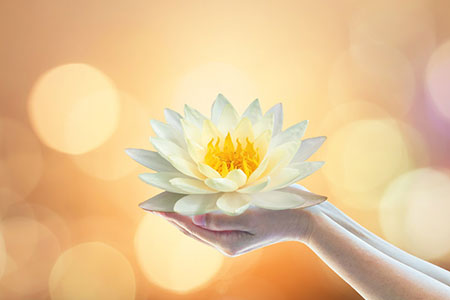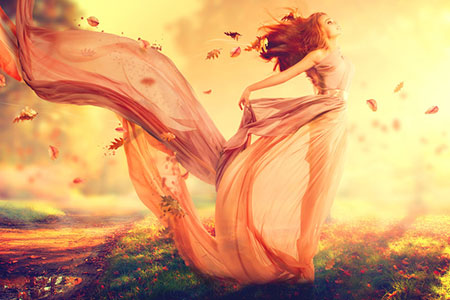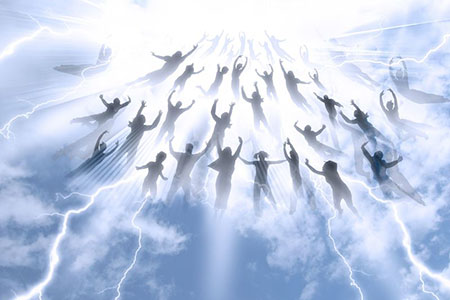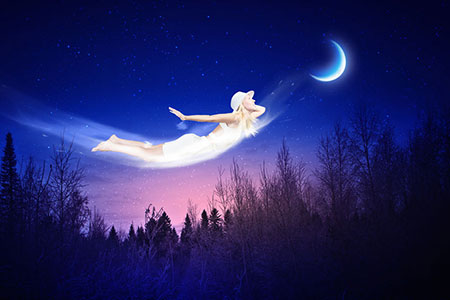rebirth
The Lotus Flower Reading
 I recently attended an online psychic development workshop. In one of the tasks, we had to partner with another student and do a ‘flower reading.’ I know touching an object using psychometry works well in readings, but this is something else.
I recently attended an online psychic development workshop. In one of the tasks, we had to partner with another student and do a ‘flower reading.’ I know touching an object using psychometry works well in readings, but this is something else.
Our teacher paired us up and we didn’t know in advance with whom. We also had to intuitively pick a flower for our partner beforehand. At the beginning of the session, we had to show the other person the actual flower or a color photo of the flower we had chosen for them on our shared screens.
In preparation for this, I placed many pieces of paper, each with the name of a different flower on it, into a bag, shook it up, and drew one. Spirit guided me to select the Indian lotus flower or nelumbo nucifera.
When it was my turn to read for my classmate, I relaxed and observed the image of the lovely white lotus in front of me. The depth of information that came forth in the reading about her past, how her life was now, and what lay ahead, was truly amazing!
The reading revealed that she was going to be blossoming soon like the lotus, because she currently finds herself in a strong development stage. I later learned that she’d been through some dark times, almost giving up on herself. She had recently begun doing deep shadow work, as well as exploring her psychic development.
She is also recovering from a recent trauma and the lotus is traditionally known for being the ideal gift for someone recovering from any traumatic experience or physical injury. Many years ago, I attended a Yoga class during which the challenges of the lotus position was discussed in-depth. The teacher said that through proper breathwork and becoming more flexible, one’s body will allow you to achieve this pose.
I was only 19 years old at the time and not very supple. I saw no hope of achieving that position for quite some time. However, only a few classes later, we did a session during which a lot of emphasis was placed on our breathing. And to my amazement, I was able to easily get into the lotus position!
The Special Magic Of Autumn
 I’ve often wondered if in a former lifetime I might have had a birthday in the fall? More specifically, I sense it must have been in the month of September, because I typically experience increased awareness and great change during this month.
I’ve often wondered if in a former lifetime I might have had a birthday in the fall? More specifically, I sense it must have been in the month of September, because I typically experience increased awareness and great change during this month.
Being a Gemini, born in June, this makes absolutely no sense, but I don’t always pay attention to what makes sense. I rather go with what feels right.
I feel a special magic in the air in the fall that I do not experience in any other season. In the autumn the world of the living seems to move closer to the afterlife and our deceased loved ones.
Traditionally All Hallows’ Eve on October 31st is believed to be time when the veil between the two worlds is most thin and we can more easily connect with our departed loved ones on the Other Side.
In the Northern Hemisphere September is the time of year when Mother Nature is shedding her leaves as the cooler air moves. Might this also be a time for us to let go of the aspects of our lives that no longer serve us? And could it be that our deceased loved ones in Heaven support and help to facilitate this need for us to surrender and let go?
The energy of September is an in-between state of transition that will ultimately spark us into new beginnings. But sometimes we need a little bit of extra magic, as it takes much courage to let go of the old and familiar to step onto a new path.
Our family and friends in Heaven want to see us progress and grow while in the Earth realm. Our loved ones who have crossed over to the Other Side can see forward and backward in time. They have the ability to open doors for us who are still in this life.
The Origins And Journey Of The Soul
 Where do souls come from? Souls are created in a place I know as the Guf, or the ‘Tree of Souls.’ In Jewish mysticism this Tree of Life is located in the Garden of Eden. When this tree blossoms, it produces new souls.
Where do souls come from? Souls are created in a place I know as the Guf, or the ‘Tree of Souls.’ In Jewish mysticism this Tree of Life is located in the Garden of Eden. When this tree blossoms, it produces new souls.
This ‘Treasury of Souls’ is said to be located in the Seventh Heaven. I have seen this place in a dream vision. I could go up to the gold and emerald gates, but could not enter. It is my understanding that all souls are created here by God.
Souls in the Guf are in different stages of evolution. There are young souls and old souls – a diversity of spirit energies waiting to incarnate, reincarnate and ascend.
I can usually distinguish the young, new souls from the wiser and more experienced, because they tend to be a bit ‘wild’ and unrestrained. Young souls are typically eager to experience as many things as possible, and sometimes rush in ‘where angels fear to tread.’ If they are exceptionally gifted, they also need to be guided properly. Many old souls reincarnate to the earth plane to help ground and guide these younger souls.
The old souls also return to provide the physical world with the many things needed for us to thrive, such as advancements in the arts, sciences and technology. Sadly, some greedy, spiritually unconscious humans abuse these gifts to the world for their personal gain. This causes much unnecessary suffering in the world.
When we decide in this life that we would like to have a child, it means our soul wants chooses to take on another soul contract. However, such a soul agreement, like any other contract, is always a two-way process. There cannot be a pregnancy unless the soul of the unborn child also chooses you as parent. In the Guf, souls can decide if they want to join a contract, or not.
The Light At The End Of The Tunnel
 As the days get longer and the weather gets warmer in the Northern Hemisphere, there is a feeling of lightness that permeates everything. The saying “April showers bring May flowers,” is especially true this year, with wet weather helping the grass to turn green and the perennials to bloom.
As the days get longer and the weather gets warmer in the Northern Hemisphere, there is a feeling of lightness that permeates everything. The saying “April showers bring May flowers,” is especially true this year, with wet weather helping the grass to turn green and the perennials to bloom.
Around the world, hope currently springs eternal, as more vaccines are being administered and COVID-19 statistics are starting to improve. We are all ready to get back to a semblance of normalcy, after more than a year of our lives being turned upside down and families separated.
Some of us are still in lockdown or subject to various restrictions. Some days are better than others. We are not entirely out of the woods yet, but at least it seems we are getting there, slowly but surely.
This past year of social restriction and isolation has however been an opportunity to reflect and make some needed changes to our lives. Although most people did not anticipate such an upheaval for so long, the additional time in isolation has allowed many of us to re-evaluate our life choices and really focus on what we want to accomplish in future.
Some of us have concentrated on charity. Some have turned to activism. Some have focused on self-care and self-healing. Regardless of our choice of focus, many of us have become more determined to make a difference in the world. This truly is one of the many blessings that has come from all the chaos.
It is important, however, that when we set these new intentions for our future, not to overreach with impossible goals or temporary plans. If feasible, choose a course of action that will be sustainable long after the immediate pressure of the pandemic has dissipated.
The Mystical Cycle Of The Moon
 Traditionally many cultures worldwide centered their spiritual practices around the Moon and the phases it cycles through once approximately every 29 days. These phases reflect the Moon’s journey around the Earth, revealing a little more or a little less of this mysterious satellite.
Traditionally many cultures worldwide centered their spiritual practices around the Moon and the phases it cycles through once approximately every 29 days. These phases reflect the Moon’s journey around the Earth, revealing a little more or a little less of this mysterious satellite.
Much like the cyclic seasons of the year, the Moon’s phases represent different aspects of personal contemplation for the spiritual practitioners and metaphysicians. The Moon represents our intuitions, hidden aspects of self, and the nurturing empathy a mother would show a child.
The New Moon begins and ends each lunar cycle. As a ‘blank canvas’ it suggests new beginnings, or the completion of a full circle. This is the starting point for working with the Moon’s phases. Time your lunar calendar each month around the New Moon. Note, it will not be visible, but instead a dark circle. Use a white candle or another source of light to represent the fully illuminated Moon that is to come and start new ideas or projects.
As the Moon grows in size it goes into its ‘waxing’ phase. It will first become a crescent shape a quarter of the way in its orbit around the Earth, and later a wedge shape called gibbous. As it grows, so too will you and your ideas. Each day, ask yourself what is going right. Ask the Universe for guidance and inspiration, and remember that it’s all right to change plans or make revisions.
As the Moon is in its growing phase, each day a little more of its surface is cast in light. The Moon also rises an hour later each day in the cycle. Its many craters are a reminder that despite perceived flaws, something can be wonderful when illuminated.
We are all awed by the sight of the Full Moon glowing in the sky. This is the time in the cycle when we can enjoy the fruits of our efforts, and also examine what worked or did not work in practice. This is also the time in the lunar cycle when emotions run at their highest, so be careful of acting too impulsively. Be sure to also show gratitude and humility for what you’ve accomplished so far.
New Hope And Appreciation For The Future
 We have all been suffering some form of hardship during the Covid-19 pandemic, including restrictions on our lifestyle, financial losses, unemployment, bankruptcy, physical and mental illness, as well as the tragic death of loved ones. Yet, despite all the adversity and chaos, our planet has continued to turn on her axis.
We have all been suffering some form of hardship during the Covid-19 pandemic, including restrictions on our lifestyle, financial losses, unemployment, bankruptcy, physical and mental illness, as well as the tragic death of loved ones. Yet, despite all the adversity and chaos, our planet has continued to turn on her axis.
In the Northern Hemisphere, we are finally starting to enjoy milder weather as the days once again get longer. The sunshine and gradual warmth feels so remarkably good after such a isolating, traumatic winter. It is a time of renewal and rebirth. Life continues to spring eternal and there is a feeling of new hope and anticipation in the air.
Although we are not completely out of the woods yet, we can be thankful that our scientific experts and medical heroes are in the process of gradually resolving the many challenges we still face. There is finally a glimmer of light at the end of the tunnel.
The extended isolation of the past year has afforded many people the time to reflect on what is truly important in life and to make the necessary adjustments to live a more balanced life of joy and fulfillment.
For many of us the importance of family and friendship has emerged front and center. For others, the privilege of gainful employment or a healthy mind and body has become their focus.
Regardless, the impact over the past year has been so great that most of us are less likely to take anything in life for granted the way we might have in the past.
These days, even the most mundane tasks and events have taken on a much greater significance. The flexibility of simply going out for no particular reason, or attending school in person, or going to a shopping mall, feels exciting and different. Just having the option of eating in a restaurant or getting a decent haircut is now a luxury that is greatly appreciated.
The Cosmic Dance Of Life’s Challenges
 No matter where in the world you live, the seasons always change, albeit some may present with changes that are more subtle than in other places. While there may be an unexplained blizzard in Florida in March, the windswept islands of the Greater Antilles may be balmy year-round with few dramatic changes in weather.
No matter where in the world you live, the seasons always change, albeit some may present with changes that are more subtle than in other places. While there may be an unexplained blizzard in Florida in March, the windswept islands of the Greater Antilles may be balmy year-round with few dramatic changes in weather.
Wherever we live in the world, nature is a force all unto itself. It is sometimes predictable, while at other times intensely climatic, with extreme highs and lows.
As we all live on this big, green planet we call Earth, our human species is also subject to changes in our natural environment. We are all impacted by the seasons in some way, as well as climate unpredictability. It is an eternal cycle that impacts our crops, livestock and food supplies.
With nearly every turn we make, there is always an interconnectedness that is ever present – a reminder that our vast world is host to a greater macrocosm that supports each and every microcosm. In other words, Spirit, God, the Universe has our back!
The microcosm-macrocosm analogy is a reminder that there is a fundamental similarity that can be seen between the expression of life as we perceive it on this glorious planet, and the wider, infinite cosmos. Some philosophers have posited that a higher understanding of the cosmos may even be more closely inferred from the lessons of human nature, and vice versa.
Without expounding further on these mysteries, I believe we are bound on this plane by a natural ebb and flow that ushers in various degrees of change during many of life’s intervals. One lesson taught by life is that there is no growth without change. We see this in the natural world, as well as our personal lives. To move through various life stages requires fluid thinking, adaptability and purposeful actions.